

Click map to see detailed route


Click map to see detailed route

1 September Yerevan - Tbilisi
Journey to Georgia: Land of the Golden Fleece
Woke up early and Ara drove me to the Bus Station. It had rained the night before, and Ararat was at its clearest it had been in the past few days. I boarded a mashrut for Tbilisi – it cost AMD 6,500 or US$13. The landscape changed as we sped northwards, first across the dry dusty plains so typical of much of Armenia, and then into green pastures with snowcapped mountains in the background. Westwards road signs pointed to Gumri, better known to the world as Leninakan. The second largest city of Armenia was destroyed in a terrible earthquake in December 1988, with 28,000 killed. Before long, we entered that beautiful wooded region known as Lori, where ancient Armenian monasteries coexisted with Georgian ones… where some Georgians would tell you it’s actually old Georgian territory under the great Bagratid monarchs. Wait a minute, the Armenians also claim the Bagratids as their own… that beautiful Queen Tamara – she’s of Armenian descent – tell that to the Georgians and they will disown you as a friend. Well, do you want to enter into that Caucasus Game “Who got here first ?”
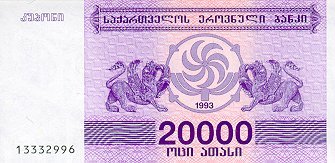 We
passed a misty narrow winding gorge, huge (probably bankrupt) heavy industrial
plants, rusty locomotives, forgotten (though not necessarily pretty) villages
and towns, lots of babushkas selling local produce and occasional cattle
and their minders. Finally it’s the border with Georgia. We
took only ¾ hour to cross the border. Surprisingly no frills.
No bribes, no hassle. Maybe things are a little different now. I
had expected trouble but none of that occurred.
We
passed a misty narrow winding gorge, huge (probably bankrupt) heavy industrial
plants, rusty locomotives, forgotten (though not necessarily pretty) villages
and towns, lots of babushkas selling local produce and occasional cattle
and their minders. Finally it’s the border with Georgia. We
took only ¾ hour to cross the border. Surprisingly no frills.
No bribes, no hassle. Maybe things are a little different now. I
had expected trouble but none of that occurred.
Georgia, known as Sakartvelo to its inhabitants, is one of the oldest
nations on Earth. To the Greeks, this is ancient Colchis, Land of the Golden
Fleece. The Romans marched through its fields stopping only at the Gates
of the Alans, which today sits on the border of Russia. Georgia adopted
Christianity in 337 AD, and became the world's 2nd Christian state, after
Armenia. Like everything else in the Caucasus, even this is at dispute,
for when I was there, the Georgians pre-empted the Armenians’ celebration
of their 1700th anniversary celebrations (meant to be held in 2001) by
celebrating the Georgian one this year instead, on what pretext I’m not
entirely clear. Anyway, the fortunes of this land rose and ebbed, as more
powerful neighbours crossed its borders at will. Its capital, Tbilisi,
founded in 458 AD, have been sacked more than 50 times in history. The
latest destruction was in 1992 when civil war shook the newly freed state.
After
a disastrous start with independence from the USSR, during which two major
regions, Abkhazia and South Ossetia, effectively seceded from the country,
Georgia is now recovering from its wounds.
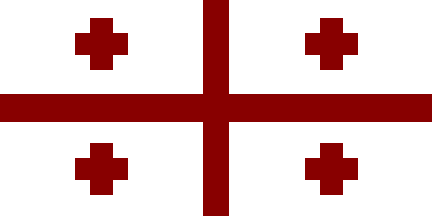 |
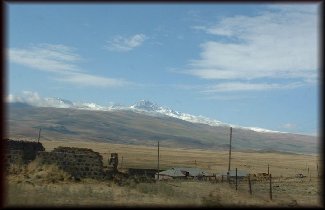 |
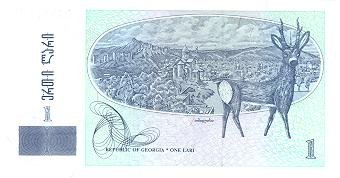 |
|
|
|
|
We might have crossed the border without problems, but trouble began soon after. The mini-bus broke down abruptly three hundred meters from the passport control, on the now pathetically rocky trail – the tarred road had for all intent and purposes disintegrated. Everybody came out and pushed it. The engine started but the bus was stalled again within 100 meters. The summer sun was burning our backs off and this time round our communal push was to no avail. A helpful local farmer came along with his tractor, and thank goodness, this time round the mini-bus started again, although with a strange noise which wasn’t very assuring. We resumed our journey to Tbilisi, which turned out to be a wonderful outdoor gym opportunity, as the bus stalled on two additional occasions, and we had to help pushed it. Sometimes, I wondered if it was the bus bringing us to Tbilisi or the other way round. What was a 6 hour journey turned out to be 9 hours.
The mini-bus passed through a region known as Javakheti. This
is a poor volcanic tableland where many Armenians migrated to in the 19th
century after the Russian conquest (which resulted in the departure of
local Turks and Muslims). The city of Akhalkalaki in the region is
also the site of a Russian military base, an important source of income
for the local Armenians. In the last few years, relations between
the Armenians and Georgians appeared to have worsened, with Armenians accusing
the Georgian government of suppressing Armenian education and rights, while
Georgians felt that the Armenians were plotting to secede and then attach
the region to Armenia. In addition, the Georgians, mindful of Russian
support for the Abkhazian and Ossetian separatists, are anxious that the
Russian military depart from this region, and the Armenians see any such
move as one designed to deprive them of security from their traditional
enemy, Turkey, as well as detrimental to their income, given the region’s
dependence on Russian military spending there.
 |
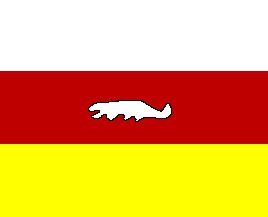 |
|
|
|
After Javakheti, we entered Kartli, the heartland of Georgia.
This is the ancient land of milk and honey once known as Iberia in classical
times. It was also the Kartli, one of the anicent tribes of Georgia,
that gave the nation its name, Sakartevelo. The first capital of
the Kartli kingdom was located in Mtskheta and that was also where Christianity
was first brought to the country. Today, this was the agricultural
hinterland of Tbilisi, and idyllic farmers (are you sure ? no fertilisers
for the fields, and the tractors’ down for no spare parts, not to mention
that the bloody oil prices have gone up and that the farmer have to pay
bribes to every bloody bureaucrats) were watching this bunch of dumb urbanites
pushing their mini-bus towards Tbilisi.
Tbilisi: Hospitality fatigue, refugees and a high cholesterol meal
I arrived in Tbilisi in the late afternoon and got a cab to Marjanishvilis Ave in the city central. Friends have recommended staying at the home of Nasi Gretadse, an elderly Georgian lady who charges tourists US$4/night for a bed in her traditional Georgian house located near the metro station. Reaching Marjanishvilis Ave was not a problem but I had wondered into a wrong compound. None of its inhabitants could speak English but they managed to find a pretty long haired girl, Lena, to assist me. Lena spoke English and after a few enquiries brought me to Nasi’s home, which was a few doors away.
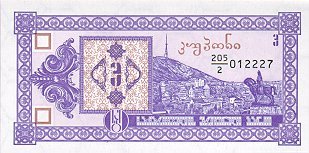 I
dumped my stuff and decided to try contacting J. and A., both British expats
in Tbilisi that I knew online. Lena helped me to ring them but we
couldn’t got through. At this point, I have decided to take a bath
and tidy my stuff, for I was simply exhausted after a long journey from
Yerevan and the previous night drinking with Onnik and his wife.
These weren’t good enough reasons for Lena, who insisted that we should
set off exploring the old city of Tbilisi. And she urged me to look
for a restaurant to try kinkali, a favourite Georgian dish. Despite
my subtle (and increasingly not-so-subtle) hints she simply couldn’t get
my “thank-you-but-leave-me-alone” signals. Eventually, I had to tell
her that I had just arrived and wanted to be alone to sort out what I wanted
to do. I have long heard about the legendary Georgian hospitality
and had experienced that on the plane. Many people I knew had been
invited by strangers for a meal or a free night’s stay, despite local poverty.
They often say, in Georgia, guests are Heaven’s gifts and hence must be
treated well at all costs. Even then, sometimes, it could be extremely
oppressive and in the words of a foreigner expat in Tbilisi, one’s made
to feel as though he’s kidnapped by the locals. It means very little
personal space and time for the foreigner, who may sometimes prefer to
be alone.
I
dumped my stuff and decided to try contacting J. and A., both British expats
in Tbilisi that I knew online. Lena helped me to ring them but we
couldn’t got through. At this point, I have decided to take a bath
and tidy my stuff, for I was simply exhausted after a long journey from
Yerevan and the previous night drinking with Onnik and his wife.
These weren’t good enough reasons for Lena, who insisted that we should
set off exploring the old city of Tbilisi. And she urged me to look
for a restaurant to try kinkali, a favourite Georgian dish. Despite
my subtle (and increasingly not-so-subtle) hints she simply couldn’t get
my “thank-you-but-leave-me-alone” signals. Eventually, I had to tell
her that I had just arrived and wanted to be alone to sort out what I wanted
to do. I have long heard about the legendary Georgian hospitality
and had experienced that on the plane. Many people I knew had been
invited by strangers for a meal or a free night’s stay, despite local poverty.
They often say, in Georgia, guests are Heaven’s gifts and hence must be
treated well at all costs. Even then, sometimes, it could be extremely
oppressive and in the words of a foreigner expat in Tbilisi, one’s made
to feel as though he’s kidnapped by the locals. It means very little
personal space and time for the foreigner, who may sometimes prefer to
be alone.
After a bath, I walked across Mtkvari River (Kura in Russian) to the
Republic Square. This is the heart of the city and around the square
are several huge Soviet era buildings including the Post Office and the
top hotel in town in the old days, Hotel Iveria. Luxury hotel no
longer, Iveria is now full of refugees from Abkhazia, the breakaway region.
Well, as they have said, the Georgians were so hospitable that they couldn’t
imagine letting the refugees live in slums and makeshift camps. Instead
they were invited into the best hotels all over the country… well, of course,
the result was not unexpected. The top hotels have been turned into
slums… Only 10 rooms are rented out to tourists. Many of these refugees
have been here since the loss of Abkhazia in 1993 and one does wonder if
the conflict would ever be resolved, i.e., whether these refugees would
ever return home. I walked in to look for Iveria Travel, which I
got in touch before arrival to arrange transport up the Georgian Military
Highway and to Statili, an ancient fortress village on the border with
Chechenya. But it was after office hours and no one was in.
I wondered into Rustaveli Avenue, Tbilisi’s most celebrated boulevard.
Named after Shota Rustaveli of Queen Tamar’s court, who wrote Georgia’s
greatest epic Knight in the Panther’s Skin, the avenue is a beautiful tree-lined
boulevard with theatres, government buildings, statues, and cafes.
A great place for people watching too, and the favourite street for many
Georgians. Smartly dressed Tbilisians strolled along the tree-lined Rustaveli
Avenue and sweet smells of Khachapuri, the national snack best described
as a cheese-filled bread, fills the air. I dropped by a basement
café at No. 20+ where wonderful Adjarian khachapuri (known as adjarpuri)
is served. Adjaria is an autonomous republic in western Georgia and
their version has a huge egg floating in the middle. Not for those
fearful of cholesterol levels. That was really a wonderful meal,
especially for one who hadn’t had proper breakfast and lunch. An
interesting observation – this café appeared to be popular and famous,
and yet it sold few items apart for the achapuri. It was obviously
overstaffed with basbushas (whose white sanitised uniforms seem to remind
one more of nurses than restaurant staff) with not much to do. There’s
no décor, and the place clearly looked clinical – wonder which comes
first: clinical décor or nurse-like staff…
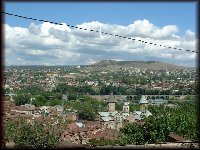 |
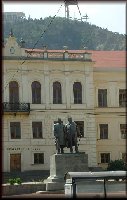 |
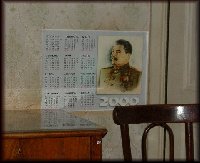 |
|
|
|
|
Nevertheless, it was a great meal despite the hospital-like environment and I continued my stroll along Rustaveli. Tbilisi was a nice change after dusty Yerevan. People were cheerful, and there seemed to be more shops and fanciful merchandise – of course Armenian sceptics would say that was mere indication of a mafia-controlled economy and corruption-driven wealth. Whatever but clearly most Caucasus travellers I know see Tbilisi as the most attractive of the three Caucasus capitals.
It was getting dark and after a quick stint at an internet place in
the Post Office, I returned to Nasi’s house. I met other travellers
there as well – a Japanese journalist who had been here for 3 months, and
two Canadian girls who had travelled from Baku – they loved Baku and fired
my desire to visit the city some time. And so, under the watchful
eyes of Joseph Stalin, whose portrait calendar 2000 stared down from the
wall of my room, I spent my first night in Tbilisi.
![]() 2
September Tbilisi
2
September Tbilisi
Ever read a “drunk email” ?